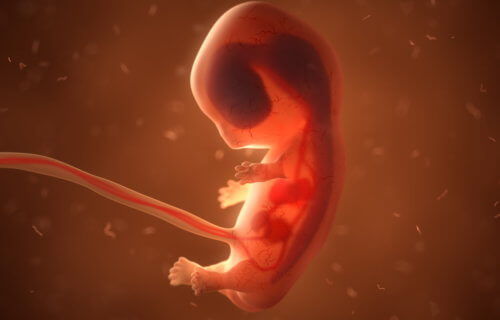NEW BRUNSWICK, N.J. — Maintaining a healthy weight during pregnancy isn’t just important for mom — it’s important for the baby’s future health too. Researchers from Rutgers University report that children born to mothers who are obese during pregnancy and nursing may eventually develop obesity themselves.
According to the study, when a child in the womb is given “early over-nutrition” it can actually rewire their developing brain to crave more unhealthy snacks and foods.
This link between mother and child was studied via an experiment involving mice. To start, some mice were grew obese by eating unlimited high-fat food during pregnancy and breastfeeding. Meanwhile, other rodents were kept slim by eating healthier foods. Study authors discovered that while adolescent mice born to obese mothers did stay skinny in adulthood while eating unlimited healthy food, they overate if given access to unhealthy foods.
Results indicate that while individuals born to mothers who were overweight during pregnancy and nursing may find it harder to regulate their snacking habits, they can still safely satisfy their hunger with healthy foods. Researchers add this work may help drive the future development of brain-altering drugs intended to cut down on unhealthy food cravings.
“People born to overweight or obese mothers tend to be heavier in adulthood than people born to leaner mothers, and experiments like this suggest that the explanation goes beyond environmental factors such as learning unhealthy eating habits in childhood,” says Mark Rossi, a professor of psychiatry at Rutgers Robert Wood Johnson Medical School and senior author of the study, in a statement. “Over-nutrition during pregnancy and nursing appears to rewire the brains of developing children and, possibly, future generations.”

For the experiment, study authors provided high-fat food to three sister mice, and healthier food to another three of their sisters. Upon completion of breastfeeding, study authors focused on their close to 50 offspring. As expected, the adolescent mice started with either heavier or lighter weights, depending on their mom’s diet.
Collective weights converged (at healthy levels) after all the rodents were given several weeks worth of unlimited healthy food, yet diverged again when researchers offered constant access to a high-fat diet. When this happened all the mice overate, but mice born to overweight mothers overate significantly more than others. Additional analyses suggest that these observed behaviors likely stem from varying connections between two distinct brain regions (the hypothalamus, the amygdala) appearing due to differing maternal nutrition during both pregnancy and breastfeeding.
All in all, the research team says this work offers something of a mixed bag for those born to overweight mothers who now find themselves struggling with weight gain as adults. While this study does suggest it’s possible to stay slim by eating healthy foods to satiety while avoiding junk foods, it also indicates attempting to eat moderate quantities of unhealthy treats may end up leading to overconsumption and obesity.
Moving forward, these findings in relation to disrupted brain circuits among the two rodent cohorts may one day help shape the creation of new drugs that could block this observed excess desire to consume more unhealthy foods. “There’s still more work to do because we don’t yet fully understand how these changes are happening, even in mice,” Prof. Rossi concludes. “But each experiment tells us a little more, and each little bit we learn about the processes that drive overeating may uncover a strategy for potential therapies.”
The study is published in Molecular Metabolism.

How much of this is real and how much either a sales pitch or some social influence slithering in?